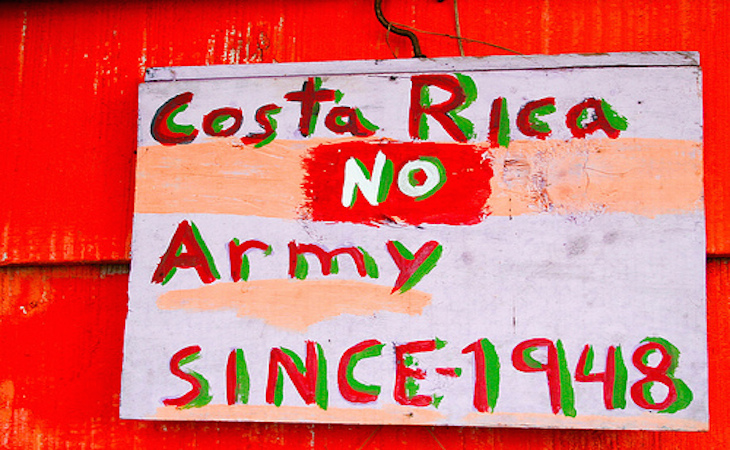
What If Wars Were Illegal
And All Armies Were Abolished?
Giovanny Blanco / Mundo sin Guerras y sin Violencia & Prezzenza
COSTA RICA (December 21, 2023) — In Costa Rica we celebrated on December 1st, 75 years since the abolition of the army, a decision promoted by Don José Figueres Ferrer, the General who won the last civil war fought in this country in 1948. The event was announced in front of the Bellavista Barracks, as well as the decision to convert it into a museum.
Today, in our Costa Rican social vision, the fact that there is no army, no weapons, no tanks, and that the former barracks are museums, is totally installed in our society.
What for many people in many countries at war is an unthinkable and utopian wish, for us Costa Ricans is a reality, which we enjoy and are proud of, because living without an army is a step in human evolution.
Faced with the impotence and pain caused by so many wars on our planet, Costa Rica emerges as a beacon of hope and inspiration to other countries, especially at this time when armed conflicts are intensifying, causing the massacre of so many innocent lives, including thousands of children trapped in this cruel reality. In addition, there is the ever-present threat of nuclear escalation that threatens the survival of the entire human race.

From the perspective of those who believe that national security and the protection of sovereignty can only be defended through the armed forces, to propose the elimination of armies is not only unthinkable, but irresponsible.
For others, the elimination of the army in Costa Rica is a myth, because by not having this figure, the police forces have been militarised and trained, so that despite not having an official military, there is a wing of the Public Forces, ready in case of border conflicts.
In my opinion, the powerful and significant message that Costa Rica sends to the world cannot be discredited, because it is charged with experience, with positive energy, with a feeling of hope, which shouts to all other nations that it is possible to live without an army, without the grotesque image of heavy weapons in our streets, without military service for our young people, without having to grant political power to military forces for more than 70 years.
Certainly, peace is not only the absence of war, and in Costa Rica we are currently living in a convulsive reality with increasing violence, drug trafficking, citizen insecurity and the weakening of our social achievements in health, education, human rights and real democracy.
Aware of this, we are called to protect the legacy of our ancestors, as a people who promote peace at the international level, but who also know how to unite to defend social peace and nonviolence in their territories.
Perhaps Costa Rica’s contribution in this regard is to send a signal to the international concert of nations: it is possible to live without an army, national security does not have to be in the hands of the military, we can bet on dialogue, diplomacy, multilateralism and international courts of justice.
Costa Rica, as a reference for this model, should perfect it and return to the path of prioritising public investment in education, health and a culture of peace, taking advantage of the fact that it has no military spending.
We, at World without Wars and without Violence, will be proposing that war should not be used as a method of resolving conflicts between countries, and that this should be included in the Constitutions of all States.
Dialogue, diplomacy, negotiation and multilateralism should take precedence over military conflicts. Given this logic, the need for armies would be questioned and their role would have to change, as Silo indicates in the Eighth Letter of his book “Letters to my friends”:
We have fixed the humanist point of view regarding the armed forces in relation to political power and to society. It is the people in arms who have an enormous amount of work ahead of them in theory and in practical implementation to adapt schemes to this special time the world is living through.
The opinion of society and the genuine interest of the forces in knowing that opinion, even if it is not specialised, is of fundamental importance. The world has changed for everyone, including the armed forces.
The future path to conflict resolution without the use of war and therefore without armies – at least as we know them today – will only be possible if the right conditions are created, both at the level of constitutional jurisprudence in each country and the parallel enactment of regional agreements and the ratification of international laws to declare wars illegal.
There are more of us who want Peace, if we unite we will be a great voice that could make itself felt in many countries, putting pressure on governments to take the step that Costa Rica took towards the abolition of the army, or towards changing the role they play, turning them into instruments for peace, progressively disarming their arsenals and allocating their budgets to environmental protection, natural disaster relief, health and education for nonviolence, following the premise pointed out by the Dalai Lama: “When peace is the priority, abolition of the army is the way forward. “